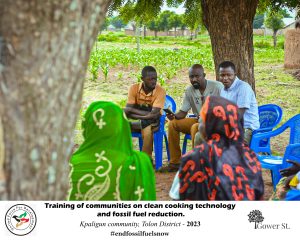Date: 5th February, 2025
Time: 10:00 am
Our team embarked on a successful journey to the community, where we were warmly welcomed by our contact person, Mr. Bawa. He led us to the chief’s palace, where we formally introduced ourselves and outlined our mission for coming to the community. The chief and his elders expressed their appreciation for selecting their community as a beneficiary of this initiative and granted us permission to proceed with our activities.
Following this, we proceeded to the gathering area where the women had assembled. Mr. Bawa addressed them, formally introducing our team. Mr. Abdul Fatawu then provided further introductions, highlighting our partners and explaining the mission of the program to the beneficiaries.
The day’s training was led by Mr. Abdul Mumin, who engaged the participants in an interactive session before commencing the hands-on demonstration. He carefully explained the measurement of materials, emphasizing the importance of precision. Within a few minutes, the process was underway, and the participants observed as the materials were molded into charcoal balls, which were then set aside to dry under the sun.
The session was engaging and informative, marking another step toward empowering the community through skill development and sustainable practices.

Following the demonstration, the women expressed their heartfelt gratitude for the valuable skill they had learned. They assured the team that they would put the knowledge into practice and transition away from cutting down trees for firewood and charcoal production.


Our partners also took the opportunity to commend the participants for their openness to this new initiative. They encouraged them to continue practicing the technique and fully embrace sustainable alternatives to tree felling.
To conclude the engagement, a brief meeting was held at the office to discuss key takeaways and future plans. After a productive discussion, the team exchanged farewells, marking the end of a successful training session.







